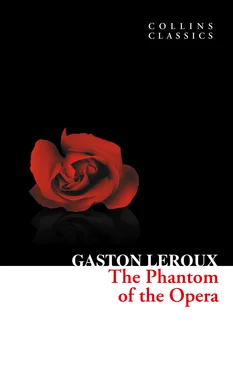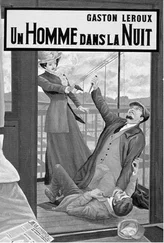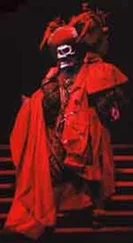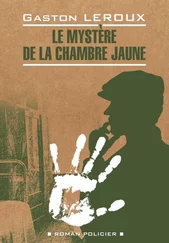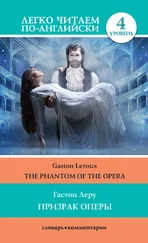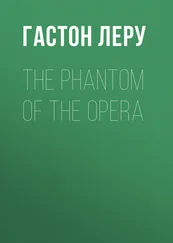“Who’s Lachenel?” asked Richard.
“He’s your stud-groom.”
“What do you mean? My stud-groom?”
“Yes, sir,” explained Mercier, “there are several grooms at the Opera and M. Lachenel is at the head of them.”
“And what does this groom do?”
“He has the chief management of the stable.”
“What stable?”
“Why, yours, sir, the stable of the Opera.”
“Is there a stable at the Opera? Upon my word, I didn’t know. Where is it?”
“In the cellars, on the Rotunda side. It’s a very important department; we have twelve horses.”
“Twelve horses! And what for, in Heaven’s name?”
“Why, we want trained horses for the processions in the Juive, the Profeta and so on; horses ‘used to the boards.’ It is the grooms’ business to teach them. M. Lachenel is very clever at it. He used to manage Franconi’s stables.”
“Very well … but what does he want?”
“I don’t know; I never saw him in such a state.”
“He can come in.”
M. Lachenel came in, carrying a riding-whip, with which he struck his right boot in an irritable manner.
“Good morning, M. Lachenel,” said Richard, somewhat impressed. “To what do we owe the honour of your visit?”
“Mr. Manager, I have come to ask you to get rid of the whole stable.”
“What, you want to get rid of our horses?”
“I’m not talking of the horses, but of the stablemen.”
“How many stablemen have you, M. Lachenel?”
“Six.”
“Six stablemen! That’s at least two too many.”
“These are ‘places,’” Mercier interposed, “created and forced upon us by the under-secretary for fine arts. They are filled by protégés of the government and, if I may venture to …”
“I don’t care a hang for the government!” roared Richard. “We don’t need more than four stablemen for twelve horses.”
“Eleven,” said the head riding-master, correcting him.
“Twelve,” repeated Richard.
“Eleven,” repeated Lachenel.
“Oh, the acting-manager told me that you had twelve horses!”
“I did have twelve, but I have only eleven since César was stolen.”
And M. Lachenel gave himself a great smack on the boot with his whip.
“Has César been stolen?” cried the acting-manager. “César, the white horse in the Profeta? ”
“There are not two Césars,” said the studgroom dryly. “I was ten years at Franconi’s and I have seen plenty of horses in my time. Well, there are not two Césars. And he’s been stolen.”
“How?”
“I don’t know. Nobody knows. That’s why I have come to ask you to sack the whole stable.”
“What do your stablemen say?”
“All sorts of nonsense. Some of them accuse the supers. Others pretend that it’s the acting-manager’s doorkeeper …”
“My doorkeeper? I’ll answer for him as I would for myself!” protested Mercier.
“But, after all, M. Lachenel,” cried Richard, “you must have some idea.”
“Yes, I have,” M. Lachenel declared. “I have an idea and I’ll tell you what it is. There’s no doubt about it in my mind.” He walked up to the two managers and whispered. “It’s the ghost who did the trick!”
Richard gave a jump.
“What, you too! You too!”
“How do you mean, I too? Isn’t it natural, after what I saw?”
“What did you see?”
“I saw, as clearly as I now see you, a black shadow riding a white horse that was as like César as two peas!”
“And did you run after them?”
“I did and I shouted, but they were too fast for me and disappeared in the darkness of the underground gallery.”
M. Richard rose. “That will do, M. Lachenel. You can go…. We will lodge a complaint against the ghost .”
“And sack my stable?”
“Oh, of course! Good morning.”
M. Lachenel bowed and withdrew. Richard foamed at the mouth.
“Settle that idiot’s account at once, please.”
“He is a friend of the government representative’s!” Mercier ventured to say.
“And he takes his vermouth at Tortoni’s with Lagréné, Scholl and Pertuiset, the lion-hunter,” added Moncharmin. “We shall have the whole press against us! He’ll tell the story of the ghost; and everybody will be laughing at our expense! We may as well be dead as ridiculous!”
“All right, say no more about it.”
At that moment the door opened. It must have been deserted by its usual Cerberus, for Mame Giry entered without ceremony, holding a letter in her hand, and said hurriedly:
“I beg your pardon, excuse me, gentlemen, but I had a letter this morning from the Opera ghost. He told me to come to you, that you had something to …”
She did not complete the sentence. She saw Firmin Richard’s face; and it was a terrible sight. He seemed ready to burst. He said nothing, he could not speak. But suddenly he acted. First, his left arm seized upon the quaint person of Mame Giry and made her describe so unexpected a semicircle that she uttered a despairing cry. Next, his right foot imprinted its sole on the black taffeta of a skirt which certainly had never before undergone a similar outrage in a similar place. The thing happened so quickly that Mame Giry, when in the passage, was still quite bewildered and seemed not to understand. But, suddenly, she understood; and the Opera rang with her indignant yells, her violent protests and threats.
About the same time, Carlotta, who had a small house of her own in the Rue du Faubourg St.-Honoré, rang for her maid, who brought her letters to her bed. Among them was an anonymous missive, written in red ink, in a hesitating, clumsy hand, which ran:
If you appear to-night, you must be prepared for a great misfortune at the moment when you open your mouth to sing … a misfortune worse than death.
The letter took away Carlotta’s appetite for breakfast. She pushed back her chocolate, sat up in bed and thought hard. It was not the first letter of the kind which she had received, but she never had one couched in such threatening terms.
She thought herself, at that time, the victim of a thousand jealous attempts and went about saying that she had a secret enemy who had sworn to ruin her. She pretended that a wicked plot was being hatched against her, a cabal which would come to a head one of those days; but she added that she was not the woman to be intimidated.
The truth is that, if there was a cabal, it was led by Carlotta herself against poor Christine, who had no suspicion of it. Carlotta had never forgiven Christine for the triumph which she had achieved when taking her place at a moment’s notice. When Carlotta heard of the astounding reception bestowed upon her understudy, she was at once cured of an incipient attack of bronchitis and a bad fit of sulking against the management and lost the slightest inclination to shirk her duties. From that time, she worked with all her might to “smother” her rival, enlisting the services of influential friends to persuade the managers not to give Christine an opportunity for a fresh triumph. Certain newspapers which had begun to extol the talent of Christine now interested themselves only in the fame of Carlotta. Lastly, in the theatre itself, the celebrated, but heartless and soulless diva made the most scandalous remarks about Christine and tried to cause her endless minor unpleasantnesses.
When Carlotta had finished thinking over the threat contained in the strange letter, she got up.
“We shall see,” she said, adding a few oaths in her native Spanish with a very determined air.
The first thing she saw, when looking out of her window, was a hearse. She was very superstitious; and the hearse and the letter convinced her that she was running the most serious dangers that evening. She collected all her supporters, told them that she was threatened at that evening’s performance with a plot organized by Christine Daaé and declared that they must play a trick upon that chit by filling the house with her, Carlotta’s, admirers. She had no lack of them, had she? She relied upon them to hold themselves prepared for any eventuality and to silence the adversaries, if, as she feared, they created a disturbance.
Читать дальше
